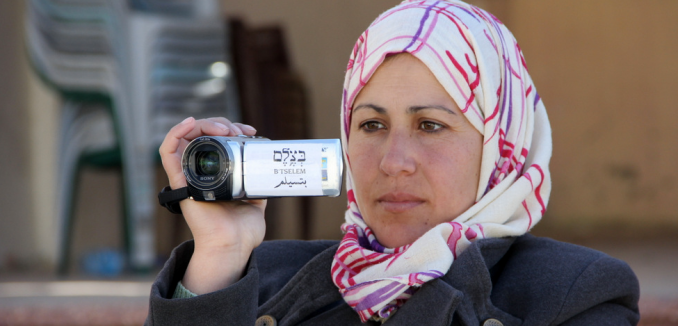Over the past few weeks, two of Israel’s largest non-governmental organizations (NGOs) offered radically different visions for the future of human rights advocacy.
On February 9, Haaretz published a lengthy interview with Hagai El-Ad, the executive director of B’Tselem, an organization that documents alleged human rights abuses committed by the Israeli government and army against Palestinians. El-Ad described how his organization has invited European governments and the United Nations to pressure Israel. Within Israel, though, B’Tselem has openly rejected cooperation with the courts and the army, which El-Ad accuses of being complicit in “the occupation.”
By contrast, in a recent email to supporters, Sharon Abraham-Weiss, executive director of the Association for Civil Rights in Israel (ACRI), defended petitioning the Supreme Court to assess controversial legislation instead of letting the government “deal with the consequences of its actions.”
“We cannot stand idly by … there are human lives at stake … as a human rights organization we do not need to consider politics, but rather defend rights,” she wrote. (Michael Sfard, a lawyer affiliated with many Israeli NGOs who is working with ACRI on its case, wrote similarly in Haaretz on February 19, although in the past he has been more skeptical about Israeli courts.)
Ironically, Abraham-Weiss replaced El-Ad at ACRI in 2014. El-Ad left in order to implement B’Tselem’s “strategic realignment,” i.e. its embrace of the radical fringe of Israeli politics.
El-Ad once described B’Tselem’s mission as one of “dissent.” But his position has since become considerably more extreme. Now, he declares, the courts are illegitimate and there is no point in working with any state institutions whatsoever.
This is an abandonment of impartial human rights advocacy, which many in the international community attribute to B’Tselem. Instead, B’Tselem should be seen as an overtly political organization, dedicated solely to ending Israel’s occupation of the West Bank.
In principle, B’Tselem has the right to abandon its work as a human rights NGO in favor of partisan political advocacy, but it is hypocritical for it to advertise itself as an organization dedicated to an objective analysis of the human rights situation in Israel.
Moreover, El-Ad’s aggressive and anti-democratic message is disturbing. Unable to convince the Israeli public to accept its views, B’Tselem under El-Ad’s leadership has elected to wash its hands of Israeli society by lobbying European governments and the UN, asking them to impose their views on the Israeli people (and the Palestinians, for that matter). El-Ad’s October appearance at a UN Security Council side-event— sponsored by Venezuela and other notorious human rights abusers—was but one recent example.
El-Ad and B’Tselem can engage in these stunts thanks to the millions of shekels provided annually by the European Union and its member governments, including Denmark, France, Germany, Ireland, the Netherlands, Norway, Switzerland, Sweden, and the UK. This foreign funding is provided with no public debate whatsoever. even as El-Ad demands “responsibility” from the “top brass” of the army, the Military Advocate General, the defense minister, and the prime minister, among others. He darkly warns that accountability will come from international actors—the International Criminal Court, the UN Security Council, and Israel’s trade partners—if Israel does not conform to his vision by changing its policies on the West Bank and Gaza.
It is clear that all of El-Ad’s talk about responsibility, all his notions of agency and accountability, do not extend to his own behavior and that of B’Tselem. El-Ad rejects the notion that B’Tselem should answer for the negative consequences of its international advocacy activities and the implications of the policies the NGO seeks to impose on Israel.
According to El-Ad, B’Tselem does not work with UN officials who immorally target Israel. Instead, “Israel is exposing itself to international legal instruments.” B’Tselem plays a role only because “our reports are accessible to all.” Apparently, El-Ad does not remember B’Tselem’s massive PR campaign during the 2014 Gaza conflict and its calls for an investigation “involving independent international observers.” He also selectively omits the story of the 2009 Goldstone Report, which defamed Israeli actions in Operation Cast Lead. B’Tselem proclaims on its website that it “provided assistance to the investigative staff of the Goldstone mission from the beginning to the end of its research.” Judge Richard Goldstone, who led the inquiry, later had the integrity to admit that he and his report were wrong. B’Tselem did not.
B’Tselem’s international advocacy clearly fuels BDS, the boycott, divestment, and sanctions campaign against Israel. Simultaneously, its false war crimes allegations are repeated and republished by UN officials and European diplomats. In a post-truth world, El-Ad claims that he and his staff are “ambassadors of facts,” but as the Goldstone affair proves, its work feeds reports that are heavy on emotional testimonials and innuendo, but light on fact-based assessments.
In an age of political polarization, the radicalization of B’Tselem has been normalized. As the organization’s activity proves, blind political advocacy has been privileged over offering a constructive way forward.
Naftali Balanson is Chief of Staff at NGO Monitor (www.ngo-monitor.org), a Jerusalem-based research institute.
[Photo: B’Tselem / Facebook]




